M.L.S. Weech's Blog, page 102
August 24, 2016
Book Review: Harry Potter and the Cursed Child by J.K. Rowling
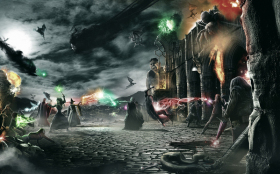 Spoiler Free Summary: 17 years after the Battle of Hogwarts, Harry, Ron, and Hermione are all grown up with children of their own. Harry’s youngest is the odd man out. It picks up right where the last book left off, only we find out who young Albus Potter sits next to on the train, and it’s the most unlikely person. Albus struggles to be the boy who’s the son of the boy who lived, and he and his friend Scorpious find all the wrong ways to make a name for themselves. When they find a mission for themselves, a mission designed to fix one of Harry’s past mistakes, they only end up discovering the costs of trying to be heroes.
Spoiler Free Summary: 17 years after the Battle of Hogwarts, Harry, Ron, and Hermione are all grown up with children of their own. Harry’s youngest is the odd man out. It picks up right where the last book left off, only we find out who young Albus Potter sits next to on the train, and it’s the most unlikely person. Albus struggles to be the boy who’s the son of the boy who lived, and he and his friend Scorpious find all the wrong ways to make a name for themselves. When they find a mission for themselves, a mission designed to fix one of Harry’s past mistakes, they only end up discovering the costs of trying to be heroes.
(NOTE: This isn’t a book. It’s a script. I think it was wise and kind of those involved to let people who love that world see what the next chapter is, and they did so in the most immediate format available. If you just want to KNOW what happened, this does the trick. Also, this isn’t a Harry Potter book. He has a significant role, but the book isn’t really about him.)
Character: This part frustrated me a bit. Albus has a solid arc, and he’s very proactive, which helps, but things seem to move a little too quickly for my taste here. It doesn’t hurt the book exactly, but readers should be ready to let a little development slide here. You can probably give some of that to the performance as this is a script, not a novel. I have to say this. The lesson and arc Albus goes through is far less external than Harry. I can see the reasoning here. Harry had to beat the overlord. How do you improve on that? Options: Bigger villain, or more dramatic focus. The most interesting part of Albus is the lesson he learned because it was the only one there was for him to learn.
 Scorpious, on the other hand completely steals the show for me. I found him more compelling anyway. He’s a young man who has to struggle with his family’s mistakes, and all he wants to do is be a kid. My opinion, this story falls short if Scorpious isn’t in it. Where Harry was clearly the hero of the last generation, Scorpious carved a place for himself in my heart. Sure, Albus does some cool things, but he wasn’t nearly as heroic as his friend.
Scorpious, on the other hand completely steals the show for me. I found him more compelling anyway. He’s a young man who has to struggle with his family’s mistakes, and all he wants to do is be a kid. My opinion, this story falls short if Scorpious isn’t in it. Where Harry was clearly the hero of the last generation, Scorpious carved a place for himself in my heart. Sure, Albus does some cool things, but he wasn’t nearly as heroic as his friend.
Exposition: This was a script, so we get a little insight into emotions and stage direction, but this is heavy based on dialogue.
Worldbuilding: This is where I think the book falls short. The writers are asking readers to believe that nearly two decades have passed, and there wasn’t a hint of progress in the world? Where the Mistborn world and even The Last Airbender worlds evolved, there’s nothing in this book to show any passage of time. This will be grounds for argument for anyone who cares to waste oxygen on it, but if the only reason they’re still using owls to communicate is because they always have, then what significant contributions are there to be made in the wizarding world? Especially with a Minister of Magic who was raised in a muggle world.
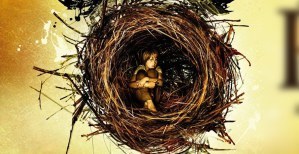 I think this is a failure on the part of the writers. I was glad to see more of the world of Harry Potter. We even get a peek at some magical developments. So if want you want is pretty much EXACTLY the same world you left, then you’re in luck. Of course, if you really wanted that, you could actually just reread the original series. For me, if I read a book nearly two decades after the last, I want some worldbuilding ways to note said passage of time.
I think this is a failure on the part of the writers. I was glad to see more of the world of Harry Potter. We even get a peek at some magical developments. So if want you want is pretty much EXACTLY the same world you left, then you’re in luck. Of course, if you really wanted that, you could actually just reread the original series. For me, if I read a book nearly two decades after the last, I want some worldbuilding ways to note said passage of time.
Dialogue: I don’t actually know if the dialogue is “good” here. There’s a lot of it. The character’s voices feel unique. I’ve never read a script before, so perhaps there’s some expectation the actors will bring the words to life. It’s honest to say it didn’t meet my expectations, but that my expectations were higher because I knew dialogue would drive the story.
Description: Again, this was a script, so there’s not much there.
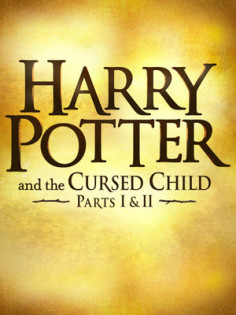 Overall: It was nostalgic to go back to this world and see what’s happened. I can say what I want about the worldbuilding, but that doesn’t diminish the wonderful characters in the story, nor does is make this book unentertaining. It is a fun, fast-paced story that I’m glad was published. I love knowing “what happened next,” and this book does that for us. I read this in about two days (which is fast even for me). Yes, I was more happy to see these characters in a new story than I was impressed with the actual plot, but it was still enjoyable. If you love Harry Potter, I imagine you’ll like this next chapter. If you didn’t love the world and style of the books though, you’ll be disappointed because it’s the same in this book.
Overall: It was nostalgic to go back to this world and see what’s happened. I can say what I want about the worldbuilding, but that doesn’t diminish the wonderful characters in the story, nor does is make this book unentertaining. It is a fun, fast-paced story that I’m glad was published. I love knowing “what happened next,” and this book does that for us. I read this in about two days (which is fast even for me). Yes, I was more happy to see these characters in a new story than I was impressed with the actual plot, but it was still enjoyable. If you love Harry Potter, I imagine you’ll like this next chapter. If you didn’t love the world and style of the books though, you’ll be disappointed because it’s the same in this book.
I’m not actually one of those who sing the praises of J.K. Rowling. She did a lot for this industry, and I really enjoyed the saga. I’m just a bit less in awe of her actual writing, and I had some serious problems with Deathly Hallows. Regardless, I was very happy I read Cursed Child. I was glad to see the characters again, and I’d look forward to more from this new generation.
Thanks for reading
Matt


August 20, 2016
Directions to New Readers
When I published The Journals of Bob Drifter, I had some pretty funny ideas about how the book would sell. I thought I had friends who would buy the book and recommend it to others. I thought those readers would recommend more. I thought I’d do a few events and I’d need boxes and boxes of my book just to keep enough stock.
 That wasn’t remotely the case. While setting up what I call my six-month tour in my little area, I did manage to get invites from a few bookstores, who not only allowed me to peddle my wares in their place of business, but they also have a few copies of my books. To this day, I’m grateful for them, but I have yet to sell a single copy of my book anywhere I’ve been that sells books.
That wasn’t remotely the case. While setting up what I call my six-month tour in my little area, I did manage to get invites from a few bookstores, who not only allowed me to peddle my wares in their place of business, but they also have a few copies of my books. To this day, I’m grateful for them, but I have yet to sell a single copy of my book anywhere I’ve been that sells books.
Now, it’s possible that I just don’t know what I’m doing. If you’ve had success at a bookstore, please let me know in the comments below. As I was looking for the closest window from which to leap, something occurred to me.
People don’t go to bookstores to find books. They go to bookstores to find books they’re looking for.
 That might sound like the same thing, but stick with me here. I love books! I love reading. I have my own little system regarding how I buy my stack of books. As I stood there watching people walk by trying ever so politely to pretend I don’t exist, I realized those people didn’t come to the book store to meet a new author. I know I don’t go to a book store to do that. I go to book stores, to find the latest books form authors I already know and love. I walk in the door, scan the “coming soon” sign, zip straight to the Fantasy section and look for those names I’ve already learned I enjoy seeing work from.
That might sound like the same thing, but stick with me here. I love books! I love reading. I have my own little system regarding how I buy my stack of books. As I stood there watching people walk by trying ever so politely to pretend I don’t exist, I realized those people didn’t come to the book store to meet a new author. I know I don’t go to a book store to do that. I go to book stores, to find the latest books form authors I already know and love. I walk in the door, scan the “coming soon” sign, zip straight to the Fantasy section and look for those names I’ve already learned I enjoy seeing work from.
How many of you have a list of favorite authors? I know I do. I have what I call “Authors who I drop what I’m reading for.” I have authors who I know I will enjoy reading while I wait for one of those other authors to finish writing another book. Every rare now and again, I’ll be so hard up for a book I’ll wander my favorite section and give a cover that draws my attention a shot. But my time is rare these days, and I have a lot more author friends now. I tend to read their work and the work of their friends.
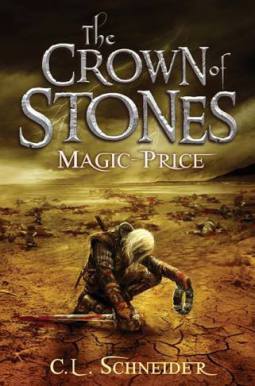 I mentioned in my last blog that I met C.L. Schneider online after I complimented this cover, but isn’t it great?
I mentioned in my last blog that I met C.L. Schneider online after I complimented this cover, but isn’t it great?The point is, I don’t meet new authors there. Do you? I give new authors a chance through one of three ways: Way One (most rare): I’m desperate for something to read, and I look for the coolest cover I can find. This scares me because I usually end up in the middle of a trilogy or not liking the book. I have a rule about finishing books I start, and sometimes the “cover” technique disappoints me.
Way Two (Next Most Rare): I read anthologies when authors I love are in them. Honestly, this has been the most reliable. I’m a huge fan of Peter V. Brett, but I never would have known about him had I not read an anthology that included Brandon Sanderson. There are a few other authors I’ve discovered in that manner, too. Lucky for me, I’m very lucky to be involved in Idle Voyages, and I’m optimistic about the chances those readers will find a bunch of authors they’ll enjoy.
Way Three (Most Common): Word of Mouth. This has burned me every bit as much as it’s been a blessing. I’ve come to expect some recommendations will be better than others.
What awkward position does this method put a self-published author in? I’ve only just been invited to participate in an anthology. I have a few friends and readers that sing my praises. I have one in particular who may have sold more of my books than I have.
Don’t fret. While I’d like to hear from others who have more success than I do through social media, I do know of one glorious place where people are willing to give new authors a shot.
 Conventions! Disclaimer: I’m a fantasy/paranormal/science fiction author. Conventions work for me because that’s where my readers go. There, they’re willing to meet people and give new authors a try. I have the most sales at conventions, and the residual sales are also more effective.
Conventions! Disclaimer: I’m a fantasy/paranormal/science fiction author. Conventions work for me because that’s where my readers go. There, they’re willing to meet people and give new authors a try. I have the most sales at conventions, and the residual sales are also more effective.
Now I noted in a lot of my earlier blogs that I went into this ignorant and without a plan. That was just plain foolish of me. Since then, I’ve become more active in social media. I’ve gotten my website to be more effective (Thanks Quintessential Editor!) It’s just too soon to see if these methods will help more, but basic marketing still holds true.
Identify your audience. No. People everywhere won’t love your book. You’re audience isn’t everyone. You’re audience is very specific. I like it when lots of people try reading my book, but when I sit and think about who will most like my book, I get a very specific picture. You should too.
 Find out where they go to hang out. You want your marketing to get your product in front of your potential readers. I promise, you can spend thousands on marketing, tracking impressions, printed products or views. Those metrics are pointless if you don’t know who you’re trying to reach. I know because I wasted thousands doing just that. Don’t make my mistake.
Find out where they go to hang out. You want your marketing to get your product in front of your potential readers. I promise, you can spend thousands on marketing, tracking impressions, printed products or views. Those metrics are pointless if you don’t know who you’re trying to reach. I know because I wasted thousands doing just that. Don’t make my mistake.
Lately, I’m much more careful about how I market and what I invest in. I make sure that what I’m paying for has some quantifiable way to measure success. When I invest, I ask, What do I want to do, and how will I track it’s effectiveness? That doesn’t always have to mean sales, but it’s nice when it does.
What am I looking for other than sales?
Active Followers. Followers who read my blogs, post comments or click likes. The more regularly they work with me, the more encouraged I am they’ll want to or have read my book. This applies to all social media platforms.
 Clicks to my buy page. When I invest in online marketing, I want to see what effectively gets people to click on the link where they can buy my book. So I measure this by tracking link clicks. I can use this same formula to gain more followers as well.
Clicks to my buy page. When I invest in online marketing, I want to see what effectively gets people to click on the link where they can buy my book. So I measure this by tracking link clicks. I can use this same formula to gain more followers as well.
Other Blogs. First off, other bloggers are awesome. I meet a lot of very smart people who in turn make me smarter. Next, I remember a rising tide floats all boats. The more you work with others, the more they’ll work with you.
To date, more than half of my sales have come from conventions. They’re demanding and draining, but they work. When Caught is released, I’m going to focus the great majority of my efforts on those conventions. It’s where I found my readers.
Have you earned sales in other ways? Do you have a trick that’s worked? I’d love to hear it. Until then, see you next time.
Thanks for reading,
Matt


August 17, 2016
Book Review: Magic-Scars by C.L. Schneider
One great thing about being on vacation is I can read much more. I reblogged my review of the Summer Indie Book Award-nominated Magic-Price last week anticipating I’d be ready to post my review of Magic-Scars today. This review also gives me a chance to try out my new format for reviews.
A note on format: Reviews are essentially opinions. Everybody has one, and at the end of the day, a person either likes a book or doesn’t. The real question is how to be objective. As a writer myself, I love an overall opinion of my book, but I also look for honest feedback. So I’m taking a page from the writer’s group I was in while stationed in San Diego. It allowed me to be objective. It also allowed me to separate myself from what I think of the person.
This format came from what I like about books and what I look for when I read books. My hope is that if readers don’t care about a certain aspect, they can skip to one they do. I’ll also give an overall opinion, which you can also scroll to directly. Please feel free to comment on the format below as I want to help authors improve and readers find books they might like to read.
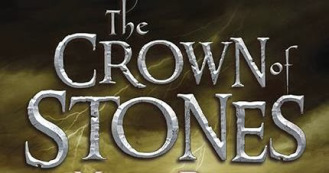 Spolier Free Summary: Magic-Scars is a sequel to Magic-Price. Scars is the second book in the Crown of Stones Trilogy. It takes place a few years after Price. Ian Troy is still fighting with his friends to stop his father from using magic to take over the world. The readers get a lot of treats here in terms of secrets revealed and progress in the story.
Spolier Free Summary: Magic-Scars is a sequel to Magic-Price. Scars is the second book in the Crown of Stones Trilogy. It takes place a few years after Price. Ian Troy is still fighting with his friends to stop his father from using magic to take over the world. The readers get a lot of treats here in terms of secrets revealed and progress in the story.
Character: Ian Troy is awesome. He’s why I liked book one, and he’s why I’m eager to read Magic-Borne, though I do want to read this Potter book I’ve heard tell about first. (NOTE: This has more to do with me trying to read The Cursed Child before someone spoils it. I’m actually more excited to read Borne at this point.) The first-person narrative drives Ian home, but I’ll be honest, I’m officially frustrated I can’t see more of the other characters. The world is so deep. As much as I love Ian, I’m upset that I can’t get into any other heads. It doesn’t necessarily hurt the book at all because, like all books that do first-person narrative well, Ian is a wonderfully sympathetic, proactive character. This is my number one requirement of all books. I don’t care how cool the magic system is. I don’t care how intricate the world building is. If the main character isn’t sympathetic and proactive, it doesn’t rank very well on my book.
 Ian isn’t the only reason to keep reading though. There’s a whole cast of characters that are fascinating. First-person narrative allowed Schneider to keep the scope of the world from getting out of control, but I’d have happily read two or three more books in the series if it meant I could have gleamed more insight as to the motivations of the other characters. Like I said, it doesn’t hurt the book.
Ian isn’t the only reason to keep reading though. There’s a whole cast of characters that are fascinating. First-person narrative allowed Schneider to keep the scope of the world from getting out of control, but I’d have happily read two or three more books in the series if it meant I could have gleamed more insight as to the motivations of the other characters. Like I said, it doesn’t hurt the book.
Exposition: Another benefit of first-person narrative is the fact that it sort of cheats the bulk of exposition. Schneider didn’t beat us to death with exposition, but there’s a lot of it. It’s woven in well with great dialogue, and it’s only something you notice if you’re up at 4 a.m. reviewing a few chapters to get a feel for it. In my opinion, if a reader has to go back to the book and look for exposition, it was done right.
Worldbuilding: This is one of Schneider’s two main strengths. The magic system is complex. As I think on it more and more, I’ll do what I always do and start looking for ways to punch holes in the system. That’s the cool part about fantasy books like this. As deep and well designed as the world is, there are a few questions about how the magic works that I’m hopeful the last book addresses. The world itself is intricately designed, as are the cultures, histories and races of this series.
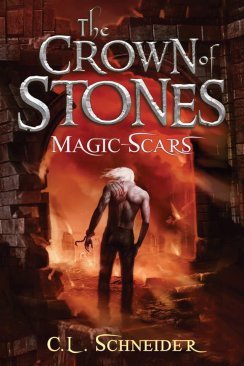 Everything feels real while reading this. Yes, there are things about the magic system that give me questions, but I’m willing to let it go until I read the last book. None of those questions feel like cheats. Usually, by book two, I like to have a pretty solid feel for how a magic system works. My gripe is that, while the basic premise is easy to grasp, I still can’t quite summarize the mechanics of how the system works. This may be because the system is a part of the plot. As we learn about the magic, we understand what’s going on in the book more. To just come out with it would cheat the reader of discovering certain things for themselves. Only those obsessed with diagraming and breakdown of abilities would be disappointed. Bonus points for the Eldering. Their history was a nice touch.
Everything feels real while reading this. Yes, there are things about the magic system that give me questions, but I’m willing to let it go until I read the last book. None of those questions feel like cheats. Usually, by book two, I like to have a pretty solid feel for how a magic system works. My gripe is that, while the basic premise is easy to grasp, I still can’t quite summarize the mechanics of how the system works. This may be because the system is a part of the plot. As we learn about the magic, we understand what’s going on in the book more. To just come out with it would cheat the reader of discovering certain things for themselves. Only those obsessed with diagraming and breakdown of abilities would be disappointed. Bonus points for the Eldering. Their history was a nice touch.
Dialogue: This is sort of in the middle for me. The characters all have a unique voice. The exchanges feel more-or-less natural. I can’t pretend to know what makes dialogue “better,” but the dialogue here isn’t bad at all. There are a few instances where some readers might argue some of the interactions, but I’m not one of them.
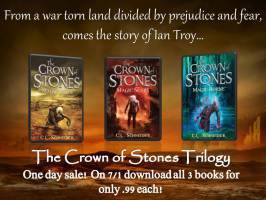 Description: I have a better sense of the world than I do the characters. I naturally see Ian more clearly in my mind that the other characters. I confess characters don’t sit well in my imagination to begin with. What I do know is that all the characters get their fair share of description. It’s not enough to get through my particularly thick skull, but I think most readers will be fine with it. I think the settings are stronger because they bring better images to my imagination. What Schneider does well though is weave those things in. I hate being beaten to death with description or minute detail. Not once in the book did I skim over a section because I felt it was just overwritten description.
Description: I have a better sense of the world than I do the characters. I naturally see Ian more clearly in my mind that the other characters. I confess characters don’t sit well in my imagination to begin with. What I do know is that all the characters get their fair share of description. It’s not enough to get through my particularly thick skull, but I think most readers will be fine with it. I think the settings are stronger because they bring better images to my imagination. What Schneider does well though is weave those things in. I hate being beaten to death with description or minute detail. Not once in the book did I skim over a section because I felt it was just overwritten description.
A note on content: There are some adult scenes in this book. Normally, this is an automatic turn-off for me. I’m more a “Fade to black” scene kind of guy. Things get steamy in this novel, but it’s not over done. In fact, one of my favorite parts in the book (one that sums up Ian rather nicely) is in such a scene. These scenes don’t oversaturate the book or get in the way of the plot. It’s a well-done balance in my opinion.
 Overall: I was a big fan of Price, and Scars is much better. Scars pays off on the potential Schneider demonstrated with Price. It’s a great second act that has just enough cliffhanger to make you want to jump straight to book three without robbing you of feeling like you’ve finished reading a novel. (I absolutely hate true cliffhangers). I’ll rate it on Amazon and Goodreads because they help authors, but ratings really are more or less an awful tool. People either like books or they don’t. So I won’t be providing a rating here because I wouldn’t invest 1,200 words on a book I didn’t love. I wouldn’t have already bought the next book in the series either. I’ll end with this…
Overall: I was a big fan of Price, and Scars is much better. Scars pays off on the potential Schneider demonstrated with Price. It’s a great second act that has just enough cliffhanger to make you want to jump straight to book three without robbing you of feeling like you’ve finished reading a novel. (I absolutely hate true cliffhangers). I’ll rate it on Amazon and Goodreads because they help authors, but ratings really are more or less an awful tool. People either like books or they don’t. So I won’t be providing a rating here because I wouldn’t invest 1,200 words on a book I didn’t love. I wouldn’t have already bought the next book in the series either. I’ll end with this…
I’ve made no secret that Schneider is a friend of mine. What I feel is important to point out is that she became my friend because she’s a wonderful person who’s been an amazing help to me and my own development. What made me seek her out was an amazing cover and a damn-well written book. I sought her out because she has skills I admire in a writer. If you’re looking for a great, fast-paced book to read, look no further.
Thanks for reading
Matt


August 16, 2016
Summer Indie Book Awards
Earlier, I announced via Facebook that The Journals of Bob Drifter has been nominated into the Fantasy category for the Summer Indie Book Awards. This, I felt warranted a lot. Here’s a list of all the nominees.
First: I can’t tell you what an honor this is. Whatever happens, just the fact that enough people liked my book and nominated it means the world to me.
(TANGENT) I talk to my friends a lot about my writing. They know what an effort I make just to keep myself relevant in the indie publishing world. It’s a lot of work, and marketing isn’t what I want to do with my life, it’s just what I have to do if I want my books to sell. If given the choice between the New York Times Best Seller List or ten readers who absolutely loved my book, I’d go with the ten.
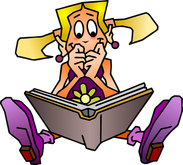 I want people to like my stories way more than I want my stories to sell. Don’t get me wrong, I’d much rather have a million sales with just as many positive reviews from happy readers who liked my book. It’s ridiculous to think EVERYONE who reads my book will love it, but I’m proud to say most of the people who’ve read Journals at least like my book. Heck, most of them even love it. That’s worth a lot in and of itself.
I want people to like my stories way more than I want my stories to sell. Don’t get me wrong, I’d much rather have a million sales with just as many positive reviews from happy readers who liked my book. It’s ridiculous to think EVERYONE who reads my book will love it, but I’m proud to say most of the people who’ve read Journals at least like my book. Heck, most of them even love it. That’s worth a lot in and of itself.
Second: One thing I beg all of you to do is to head over to the link above and like their page. Sign up to vote. Anyone who tries to recognize anyone should receive as much support as possible. I humbly request all of you do so with this organization.
Third: Voting begins Sept. 1. You can sign up for online voting here. I’m not sure how the voting will go, but I know it’s scheduled to run until Sept. 11.
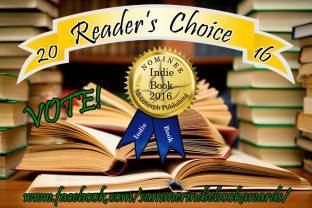 Now for the really important part. Let’s talk about awards. I can not begin to express how competitive I am. If there is a human being out there who likes winning more than me, I don’t think I’ve met the individual yet. The more I want to win, the more ridiculous I get. But winning for the sake of winning is altogether meaningless.
Now for the really important part. Let’s talk about awards. I can not begin to express how competitive I am. If there is a human being out there who likes winning more than me, I don’t think I’ve met the individual yet. The more I want to win, the more ridiculous I get. But winning for the sake of winning is altogether meaningless.
I want as many people to vote. I want everyone who’s ever read a single nominated title to vote, but the only books you should vote for are the ones you’ve read and truly loved. I’m talking, “If you were stranded on a desert island and could only bring one book (aside from the Bible. I’m a terrible Christian, but I’m not THAT poor a man of faith.) which one would it be?”
 I don’t know if you’re aware of the Hugo Awards, but year after year it seems there is more and more controversy surrounding what should be the most respected award of its kind. This is heartbreaking to me. I LOVE the Hugos. I’ve read the first four, and every Hugo winner since 2010. I’ve voted twice. This is because I only vote in categories where I’ve read every book nominated. I have favorite authors, but I don’t vote for my favorite author; I vote for the story I think best encompasses what I feel the Hugo represents. Some years, I luck out and have time to read them all; some years, I don’t.
I don’t know if you’re aware of the Hugo Awards, but year after year it seems there is more and more controversy surrounding what should be the most respected award of its kind. This is heartbreaking to me. I LOVE the Hugos. I’ve read the first four, and every Hugo winner since 2010. I’ve voted twice. This is because I only vote in categories where I’ve read every book nominated. I have favorite authors, but I don’t vote for my favorite author; I vote for the story I think best encompasses what I feel the Hugo represents. Some years, I luck out and have time to read them all; some years, I don’t.
In this situation, there are simply too many for that to be an even rational, much less reasonable demand. However, I’ve looked at the list twice, and I personally nominated three of the books, and I’ve read at least five. I’m not asking you to read them all, though I hope you’ll give all the nominees a chance. Just think, a lot of people thought these books worthy of an award. I myself plan to update my TBR list accordingly.
This isn’t me campaigning for you to vote for my book. I know EXACTLY how many people have a copy of my book. If they love it and vote for it, I’m honored. What I’m asking is that you vote, and you vote for the one book you love above others (see the aforementioned standard). Next year, the eligibility requirements will shift. I intend to try and read the nominees just as I do the Legend and Hugo awards. (NOTE: By some happenstance, I usually end up reading the Legend Nominees well before the voting begins.)
As I said, I’ve read at least five of these books, and they’re good books, a few are even great. I have a lot of sayings around my students. The most relevant one today is, “I don’t want to be the best; I want to be the best of the best.”
 In the Navy, I was a pretty decently decorated and recognized mass communication specialist. The biggest honor of my career was frocking (translation: I got to put his new rank on his collar) on of my former students to petty officer second class. (Hi Scott!). This is closely followed by the opportunity to put pins (Um…cool Navy medals that mean they know a lot of stuff) on the two young men I deployed to Afghanistan with. In fact, everything I brag the most about was how hard I worked to help others earn promotion and recognition. I want to be a part of something great wherever I go. The Slush Brain is an AMAZING group of equally AMAZING authors.
In the Navy, I was a pretty decently decorated and recognized mass communication specialist. The biggest honor of my career was frocking (translation: I got to put his new rank on his collar) on of my former students to petty officer second class. (Hi Scott!). This is closely followed by the opportunity to put pins (Um…cool Navy medals that mean they know a lot of stuff) on the two young men I deployed to Afghanistan with. In fact, everything I brag the most about was how hard I worked to help others earn promotion and recognition. I want to be a part of something great wherever I go. The Slush Brain is an AMAZING group of equally AMAZING authors.
What does this mean for this award and others? Well, if I win, I want it to be because the people who read my book though it was the best book they read out of whatever other nominated books they’ve read. If I lose, I want to purchase the winner’s book, read it, and say, “No wonder! This book is AWESOME!” (Yes, I realize I don’t have a very big adjective lexicon.)
 So instead of rallying for votes. I’m rallying for readers. Read these books. Read one of them. Read ten. Whatever book you vote for, buy the other books from that same author. I’m honored to be a part of the indie author community, and I want others to see how wonderful (found another adjective) their work is too. Support SIBA by liking their page, reading what nominated books you have the time to read, and voting, not for the person you like the most, but for the book you like the most.
So instead of rallying for votes. I’m rallying for readers. Read these books. Read one of them. Read ten. Whatever book you vote for, buy the other books from that same author. I’m honored to be a part of the indie author community, and I want others to see how wonderful (found another adjective) their work is too. Support SIBA by liking their page, reading what nominated books you have the time to read, and voting, not for the person you like the most, but for the book you like the most.
Once more, I’m honored to be nominated, I’m overjoyed to see a few dear friends also received nominations (Hi Cindy! Hi Angela!). I wish all the nominees the best of luck, and I wish all of the voters happy reading.
Thanks for reading,
Matt


August 15, 2016
Book Review: Over Your Dead Body by Dan Wells
I still feel as if Dan Wells is one of the most underrated authors out there. The John Wayne Cleaver series continues to be an amazing story about a young man who knows he’s capable of evil, and in fact desires to be evil, and chooses to be good.
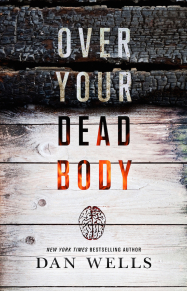 This reason alone makes the book worthy. OYDB is more predictable than some of the other John Cleaver stories, but I wonder if that wasn’t intentional. For me, this book was less bout the identity of the monster and how it operates and more about the effect that information would have on John.
This reason alone makes the book worthy. OYDB is more predictable than some of the other John Cleaver stories, but I wonder if that wasn’t intentional. For me, this book was less bout the identity of the monster and how it operates and more about the effect that information would have on John.
Where The Devil’s Only Friend bridged the first three books to this new direction, OYDB continues to push the potential of the series into new directions. It takes place relatively soon after the events of TDOF. The wit is every bit as charming. The conflict is every bit as compelling. The ending was every bit as tragically beautiful as I’ve come to expect from Wells.
This is part of a series, so if you haven’t started with book one, I recommend you do. You’ll be the lucky one though as you can read the whole series up to this point in a row; where as I had to wait for each book.
Thanks for reading,
Matt


August 13, 2016
The Cruel Fate of the Self Taught Literary Martial Artist
A while back, a young martial artist approached me on a quest. The honored Quintessential Editor mentioned me in his tale of learning and invited me to share my own.
Where he found wise mentors and kindly sages, I trained more like a 1970s martial arts movie. Here is my tale:
The Cruel Fate of the Self Taught Literary Martial Artist
*Strikes gong, then turns on 70’s Stock Music*
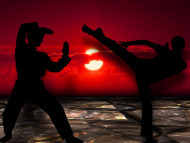 In the land of the ever setting sun, there was a young man who believed he was ready to earn a name for himself as a literary martial artist. He had trained for two long decades, and honed his tools with the utmost care. His weapons skills were formidable. His traveling pouch was full of both sustenance and funds for inns and competitions.
In the land of the ever setting sun, there was a young man who believed he was ready to earn a name for himself as a literary martial artist. He had trained for two long decades, and honed his tools with the utmost care. His weapons skills were formidable. His traveling pouch was full of both sustenance and funds for inns and competitions.
His Journals style felt like a form that could not be beat. Yeah, his Journeyman Jab and Blacksoul Blast seemed unbeatable. It was then he entered his first competition, the Tournament of Agent City.
 This was not an elimination tournament. In fact, so long as Weech Fu had a student in the competition, they could continue to earn a dojo sign. But the Agency Clan was simply too unified in purpose. The Crushing Criticism Crescent Kick and the Knife Chop of Great Denial sent the young martial artist reeling. Bloody and bruised, he stood and fought again. He took a Unintriguing Uppercut, which knocked him to his back with a thud.
This was not an elimination tournament. In fact, so long as Weech Fu had a student in the competition, they could continue to earn a dojo sign. But the Agency Clan was simply too unified in purpose. The Crushing Criticism Crescent Kick and the Knife Chop of Great Denial sent the young martial artist reeling. Bloody and bruised, he stood and fought again. He took a Unintriguing Uppercut, which knocked him to his back with a thud.
No amount of resilience could defeat the Agency Clan’s most devastating technique – the Disinterested Delayed Denial Death Dealing Strike. Indeed, even as Weech waited for the blow to come, it never seemed to. Only when he thought no attack was coming, did they strike with their seemingly lackadaisical attack, almost nonchalantly destroying Weech with what seemed to be no more effort than would be required to shoo away an annoying insect.
Weech battled anyone who would take him on. “Who are you” a member of the Agency Clan would ask.
“Master Weech of Weech Fu!” he replied. “Surely you’ve heard of me.”
His opponent’s baffled face was nearly as devastating as his foe’s No Thank You Thrust.
Every member of the Agency Clan he battled defeated Weech without even realizing he’d been in a fight.
Weech trained harder…
 After climbing No Hope Mountain and training in the bitter heat prevalent in the Land Of Rejection, Weech rededicated himself to a new path. Instead of challenging one of the Great Clans of Publishing Kung Fu, he’d simply form his own Dojo and expand it. This technique, known as the Self Publication Perfection Practice Style, was dangerous, but he felt ready.
After climbing No Hope Mountain and training in the bitter heat prevalent in the Land Of Rejection, Weech rededicated himself to a new path. Instead of challenging one of the Great Clans of Publishing Kung Fu, he’d simply form his own Dojo and expand it. This technique, known as the Self Publication Perfection Practice Style, was dangerous, but he felt ready.
He was not…
While other martial artists were working on their Advertisement Assassination Strikes and Social Media Melee Attacks, Weech simply mastered his Journals Jutsu. Indeed, any foe who dared take on this terrifying technique was likely found laid out on his straw mattress reading of the great Journeyman Jab and Black Soul Blast. Yes, he even found a student or two.
 But the Publishing Clans saw an opportunity to manipulate Weech. To feed off of his ambition. Where most were well versed in the Self Publishing Black Market, Weech was a novice, only mastering the crafts of Grammar Grappling and Worldbuilding Whirlwind Attacks. He had no counters for the Overpriced Publishing Push or the Cover Cost Press. He saw no way to counter the Marketing Misdirection Sweep or the Promise of a Better Tomorrow Throw. Weech soon found himself penniless and bloody.
But the Publishing Clans saw an opportunity to manipulate Weech. To feed off of his ambition. Where most were well versed in the Self Publishing Black Market, Weech was a novice, only mastering the crafts of Grammar Grappling and Worldbuilding Whirlwind Attacks. He had no counters for the Overpriced Publishing Push or the Cover Cost Press. He saw no way to counter the Marketing Misdirection Sweep or the Promise of a Better Tomorrow Throw. Weech soon found himself penniless and bloody.
He again set out on a training journey to learn how to pass through the Falling Failure Desert beyond the Valley of Plummeting Sales. It was there he crossed paths with the Pirate Beauty Schneider, famous throughout the lands for her Ian Insanity Addiction Attack. She offered him training in return for service to her Captain Chrysler, a swashbuckling master of the Social Media Melee and the Drui Death Drop.
“Travel with us, Master Weech, and we will ensure you’re never beaten senseless by the Great Clans of Publishing Kung Fu Houses again.”
 He accepted passage and earned a spot on the crew aboard the H.M.S. Slush Brain. Life on the ship was hard, but he trained. Still determined to win his first fight, he asked to be taken to the Land of Caught Terrors, where he was last seen practicing the Blog Bullet Strike under the tree of Website Marketing.
He accepted passage and earned a spot on the crew aboard the H.M.S. Slush Brain. Life on the ship was hard, but he trained. Still determined to win his first fight, he asked to be taken to the Land of Caught Terrors, where he was last seen practicing the Blog Bullet Strike under the tree of Website Marketing.
You can find him training still. Just look for the silhouette of a man when you gaze at the ever setting sun.
*Strikes gong, then turns off 70’s Stock Music*
So yeah, sometimes I get a little carried away with my metaphors. So in case that was entertaining but uninformative, let me summarize.
I focused on writing great books, which is still universally regarded as step one to getting published. But I didn’t get an agent, and no companies called clamoring for the rights to my book. How are my Agent Queries? How are my slush pile entries? I don’t really know. I know I solicited agents and publishing companies until I got tired of waiting and being told no.
So I published my book. I had no advertising plan. I had no marketing strategy. I thought, “I wrote a book, and it’s great! Surely everyone who reads it will demand their friends read it.”
Honestly, most people who’ve read it do recommend it. But what I have in skill (which is still developing if I’m being honest) I lack in marketing or networking. I’m better now thanks to the Slush Brain and her wonderful crew. But I’m still lost. I need to do more research and drive harder in that area.
What I hope you all take away from this is:
 Step One: Write (revise, edit again and again) a DAMN good book. I think I did that.
Step One: Write (revise, edit again and again) a DAMN good book. I think I did that.
But Step Two isn’t publish. It’s develop a marketing plan. Get your book out there. Get your name out there. While you’re revising and editing and proofreading your copy, get people clamoring for your work.
If you wrote a great book, that’s awesome, but no one will buy if no one knows it exists. That hints toward another blog I’ll work on soon regarding why people go to book stores. But that’s for another time.
Thank you for reading (and never stop training)
Matt


August 10, 2016
Book Review: Magic-Price by C.L. Schneider (REBLOG)
I posted this review last year when I finished reading Magic-Price. As I’m nearly done reading Magic-Scars, I wanted to remind everyone what convinced me to read the rest of the trilogy.
I bought this book because I saw its amazing cover while trolling on Twitter. I’m very glad I purchased it. What makes this book stand out is its blending of original ideas. I’ve read books where magic is addictive. I’ve read books where magic has a price. Here, C.L. Schneider blends the two to create an interesting source of conflict that also helps make her main character more compelling. There are other forms of blending that I like in this. The originality of this book is in the juxtaposition of ideas to create something new. As an author, that in itself was impressive. The fact that some of these themes I recognize (whether by intent of happenstance I do not know) are from other stories that I love only amplify my appreciation for this book.
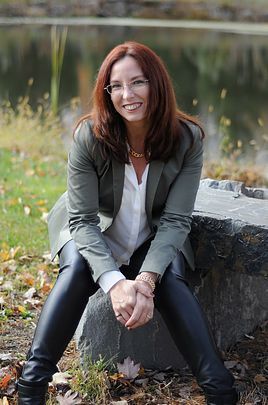 Most books that get four-star reviews from me (on Goodreads or Amazon) tend to have compelling, proactive characters, Troy has both. His supporting cast is equally compelling. It’s not common for me to like books with a scope like this told from the first-person narrative. This is because I tend to want to get in the head of multiple characters when they interest me. Even the antagonist has a point of view I would like to investigate in the future. Still, the use of first-person narrative was skillful enough that I could look past my desire to know what other characters were thinking.
Most books that get four-star reviews from me (on Goodreads or Amazon) tend to have compelling, proactive characters, Troy has both. His supporting cast is equally compelling. It’s not common for me to like books with a scope like this told from the first-person narrative. This is because I tend to want to get in the head of multiple characters when they interest me. Even the antagonist has a point of view I would like to investigate in the future. Still, the use of first-person narrative was skillful enough that I could look past my desire to know what other characters were thinking.
I’ve mentioned a few times how I have what I call “drop what you’re reading” authors. Honestly, Sanderson and Wells top the list in print form. Butcher and Brett top that list in audio form. I mention this because I also have authors who I love being able to go back to. Let’s call them “What can I count on if I want a good book” authors.
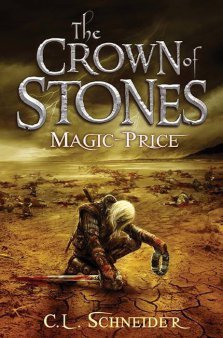 Schneider has placed herself in this category for me. It’s important to have a solid stable of writers to turn to, writers that you know will provide books with solid, interesting plots; compelling characters; and just solid writing. I’ll probably wait for a few books in the series to come out (or for it to finish). This isn’t because the books aren’t good. It’s actually the opposite. One of the best things that happened to me as a reader was getting handed Book One of the Wheel of Time. One of the worst things to happen was receiving Book One before Book 12 was finished (much less 13 and 14). As a result, I tend to be very picky about what series I start and when. So don’t take my waiting as an indication of quality. Instead, see it as the truth that I can only handle anxiously waiting for so many different books at a time.
Schneider has placed herself in this category for me. It’s important to have a solid stable of writers to turn to, writers that you know will provide books with solid, interesting plots; compelling characters; and just solid writing. I’ll probably wait for a few books in the series to come out (or for it to finish). This isn’t because the books aren’t good. It’s actually the opposite. One of the best things that happened to me as a reader was getting handed Book One of the Wheel of Time. One of the worst things to happen was receiving Book One before Book 12 was finished (much less 13 and 14). As a result, I tend to be very picky about what series I start and when. So don’t take my waiting as an indication of quality. Instead, see it as the truth that I can only handle anxiously waiting for so many different books at a time.
Anyone looking for an original magic system, intelligent blending of ideas into something original, compelling characters and seat-of-your pants action should give this book a chance. I don’t think you’ll regret it.
Thanks for Reading
M.L.S. Weech


August 6, 2016
Third Person Limited: Goldilocks Personified
A few weeks ago, I posted a blog about first person narrative, during which I gave some pros and cons to that style of writing. I followed that up last week with a post on third person omniscient.
Most books I read now are written in what I call “POV (Point of View)” or third person limited omniscient. Like the namesake maiden of the above fairy tale, this is a place I’ve come to call home as an author. Part of this is because it’s what I read, so it’s what I’m familiar with. There are a lot of wonderful examples here. I’m going to go with a few I feel are particularly special.
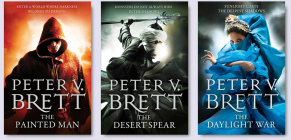 The Demon Cycle by Peter V. Brett: POV is, in my opinion, about character, and no one in the business uses POV to develop characters like Brett. I stumbled upon his writing while reading an anthology, and haven’t stopped yet. There’s a timing aspect to POV that Brett understands on an instinctual level.
The Demon Cycle by Peter V. Brett: POV is, in my opinion, about character, and no one in the business uses POV to develop characters like Brett. I stumbled upon his writing while reading an anthology, and haven’t stopped yet. There’s a timing aspect to POV that Brett understands on an instinctual level.
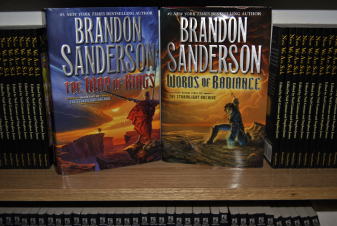 The Stormlight Archive by Brandon Sanderson: Sanderson isn’t a slouch in the character department by any means, but for my money what he does with POV is use the narrative form to show the scope of his world. I discovered Sanderson when I heard he’d been requested to finish Robert Jordan’s Wheel of Time series (which is another great example of POV). At first, I read Sanderson’s Mistborn trilogy, thinking to mock the poor man who thought he could think to touch Jordan’s world. Then I read Mistborn, and I shut my foolish mouth. He was the perfect choice for so many reasons. I digress. Sanderson uses the characters in different locations and times to present the reader an idea of the scope of the world in which they’re interacting.
The Stormlight Archive by Brandon Sanderson: Sanderson isn’t a slouch in the character department by any means, but for my money what he does with POV is use the narrative form to show the scope of his world. I discovered Sanderson when I heard he’d been requested to finish Robert Jordan’s Wheel of Time series (which is another great example of POV). At first, I read Sanderson’s Mistborn trilogy, thinking to mock the poor man who thought he could think to touch Jordan’s world. Then I read Mistborn, and I shut my foolish mouth. He was the perfect choice for so many reasons. I digress. Sanderson uses the characters in different locations and times to present the reader an idea of the scope of the world in which they’re interacting.
I’m sure the above authors and more use this form of narrative for a ton of reasons, but I wanted you to see how these masters of the craft use a tool for specific reasons.
Third person limited has become a go-to style for fantasy fiction. Perhaps some of my sci-fi readers will help me identify what style those writers lean to, but as I’ve grown up reading fantasy, I’ll stick to what I know. Third person limited is when the author takes you into the mind of one particular character. For one chapter, I might be a young woman who’s been an abused thief her whole life. The next chapter I might be a demon hunter, taking on the forces of evil. The trick is, whenever I’m in that character’s head, I’m learning what he knows, and only what he knows or observes for the duration of scene or chapter. It blends the scope of omniscient writing with the intimacy of first person.
Pros:
 Versatile: The writer can build character and show scope. The writer can present a large amount of information and hide specific pieces by carefully choosing what character’s mind to visit during a scene. Keep in mind, there are times when the reader can know information but the character can’t. POV helps with that.
Versatile: The writer can build character and show scope. The writer can present a large amount of information and hide specific pieces by carefully choosing what character’s mind to visit during a scene. Keep in mind, there are times when the reader can know information but the character can’t. POV helps with that.
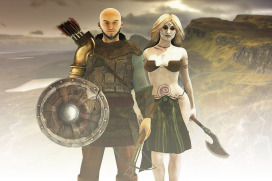 Character development and scope: I chose the above authors because they epitomize the pros I’m discussing here. Writing in POV feels like watching a really good TV series. This is because, like television, when we watch a show, we follow one character around for a time, then meet someone new. The reader isn’t overwhelmed with a dozen random characters and what they’re thinking. Instead, the reader sees the world through one set of eyes, then sees a different place, or the same place under a different set of circumstances. Quintessential Editor dug into some awesome depth on this very topic on his post regarding subtext.
Character development and scope: I chose the above authors because they epitomize the pros I’m discussing here. Writing in POV feels like watching a really good TV series. This is because, like television, when we watch a show, we follow one character around for a time, then meet someone new. The reader isn’t overwhelmed with a dozen random characters and what they’re thinking. Instead, the reader sees the world through one set of eyes, then sees a different place, or the same place under a different set of circumstances. Quintessential Editor dug into some awesome depth on this very topic on his post regarding subtext.
Cons:
Reduced Intimacy: As with any form of compromise, no one can have it all. POV is more relatable than omniscient writing, but it’s still never going to connect the reader as well to your main character as first person. The idea is the readers will each find their favorite characters. That’s awesome. In Anime, Fantasy and television, I have favorite characters. It’s a great topic for discussion, but often this pulls the reader’s sympathy from one character to many.
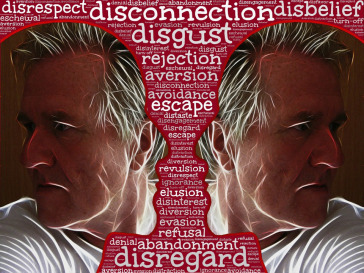 The Unfavorites: In stories told through POV, there are inevitably favorites, and there are the characters readers genuinely dislike. This is dangerous because if a reader sees too much of a character he or she doesn’t like, it’s possible the reader will either skip ahead or put the book down.
The Unfavorites: In stories told through POV, there are inevitably favorites, and there are the characters readers genuinely dislike. This is dangerous because if a reader sees too much of a character he or she doesn’t like, it’s possible the reader will either skip ahead or put the book down.
I struggled with this while reading A Feast for Crows by George R.R. Martin. The book is well written, but it was centered around characters in the world that I just don’t have a lot of interest in. Sure, some arcs were cool, but it really slowed down the pace of the book for me. Now Martin had his reasons, and I agree with those reasons. This isn’t a review on the book, it’s an example that POV has a very dangerous side effect.
If your readers don’t invest in your characters, you lose. This is the danger of all books to be honest, but the cost is amplified here because you don’t have the safety of going “all in” on one character as you do in first person, nor do you have the ability to rapidly shift from character to character as you do in omniscient. For my money, this is the most dangerous disadvantage of this form of narrative.
 Overloaded plot: I’ve already encountered this issue twice in my career. POV increases scope, but that increases your word count. In Caught, I originally had seven ongoing character viewpoints and two additional side viewpoints. That number of characters in less than 90,000 words was just too demanding on a reader to keep track of. The majority of the revisions I’m doing with caught were to narrow the number of viewpoints down from nine to six. Some will argue that is still too much.
Overloaded plot: I’ve already encountered this issue twice in my career. POV increases scope, but that increases your word count. In Caught, I originally had seven ongoing character viewpoints and two additional side viewpoints. That number of characters in less than 90,000 words was just too demanding on a reader to keep track of. The majority of the revisions I’m doing with caught were to narrow the number of viewpoints down from nine to six. Some will argue that is still too much.
In The Nick of Time, I was constantly frustrated with the cast of my book. I’d be halfway through a chapter when I legitimately realized I’d lost a character some three chapters ago. It’s easiest to get caught up in world builder’s disease using this, so the author who chooses this narrative should be fairly certain he knows the characters all have unique voices and arcs. The author should also make sure to note that the more viewpoints he or she uses, the larger the story will become.
Summary: This form of narrative has become my favorite, but in finding my favorite, I struggled because I was stubborn. It’s a tool, like omniscient or first person. If you’re writing a story with a large scope of compelling characters, or a story with a perhaps more limited number of characters that spread across great geographical distances, this might be the tool for you. I wouldn’t make this absolute, but those are the circumstances I feel best suit this type of narrative.
Did I leave something out? Care to provide a different side of some of these issues? As always, feel free to use the comments section. I had a lot of fun discussing the craft with the last post, and I look forward to more of the same.
Thanks for reading,
Matt


July 30, 2016
Third Person: The Deific Approach to Narrative
Last week, I posted a blog about first person narrative, during which I gave some pros and cons to that style of writing. First, that blog was a huge success, and I have you all to thank for it. Thank you!
Now the pressure’s on to make every post that informative and that helpful. I can only hope I don’t disappoint.
If I’m being honest, I don’t see vary many true third person narrative stories anymore. Most books I read (and I read a lot) are either told in first person or third person limited omniscient. Third person allows the reader into every character’s thoughts at any time. The author isn’t limited in any scope. He can (and should) decide when and how to provide information to the reader. I had to go pretty deep into my library to find a few examples, but I did.
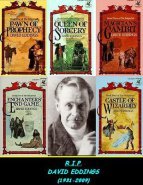 The Belgariad by David Eddings: I read the first three books in this series. Eddings is a great author who may be underrated or under-discussed. I talk about fantasy fiction and reading pretty much every day, and his work doesn’t come up very often (though someone mentioned him when I talked about cinematic universes). In all of my library, his was the one book or series that jumped out at me when I considered what I’ve read that effectively uses third person narrative.
The Belgariad by David Eddings: I read the first three books in this series. Eddings is a great author who may be underrated or under-discussed. I talk about fantasy fiction and reading pretty much every day, and his work doesn’t come up very often (though someone mentioned him when I talked about cinematic universes). In all of my library, his was the one book or series that jumped out at me when I considered what I’ve read that effectively uses third person narrative.
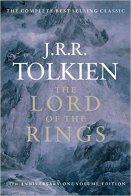 The Lord of the Rings by J.R.R. Tolkien: I know I said no other books jumped out at me, but I read LOTR in 2000 and Belgariad in 2010, so maybe give a guy a bit of a break. I don’t need to build up the success of one of the best selling series (not to mention films) in history. Tolkien is simply the standard by which all other fantasy authors are compared. I can’t tell you how many books or reviews I’ve seen that read: “Better than Tolkien” or “Takes the world Tolkien created and improved it.” When you compare every other book to one book, you prove that book to be the standard.
The Lord of the Rings by J.R.R. Tolkien: I know I said no other books jumped out at me, but I read LOTR in 2000 and Belgariad in 2010, so maybe give a guy a bit of a break. I don’t need to build up the success of one of the best selling series (not to mention films) in history. Tolkien is simply the standard by which all other fantasy authors are compared. I can’t tell you how many books or reviews I’ve seen that read: “Better than Tolkien” or “Takes the world Tolkien created and improved it.” When you compare every other book to one book, you prove that book to be the standard.
Third person omniscient used to be the standard for most fiction. It’s evolved over the years, and I may just manage to accidentally fail to find it in fiction these days. If you know of a popular series that uses it, feel free to let me know in the comments. In the mean time, let’s take a look at what it gives writers:
Pros:
 Unlimited scope: The author has the power to give the reader every thought and every opinion in every scene for every character in the book. This allows readers all the insight they could ever ask for. The author has the most control over what to reveal and what to withhold. The author allows the reader to see every angle at any time. That also makes the information more immediate. Where first person might have the reader wondering at what point they’re getting this information, the reader doesn’t worry about that issue with third person narrative. The reader gets everything as it’s happening.
Unlimited scope: The author has the power to give the reader every thought and every opinion in every scene for every character in the book. This allows readers all the insight they could ever ask for. The author has the most control over what to reveal and what to withhold. The author allows the reader to see every angle at any time. That also makes the information more immediate. Where first person might have the reader wondering at what point they’re getting this information, the reader doesn’t worry about that issue with third person narrative. The reader gets everything as it’s happening.
More reliable: I’d mentioned in my post about first person narrative that it’s hard to address the perspective of the narrator. It makes the speaker a little hard to believe. Third person narrative is more trustworthy because you know you’re getting the author’s honest account of what the characters are doing or thinking. Sure, the characters might be wrong, but the reader knows. There’s a reasonable expectation of objectivity for the readers to work with.
Cons:
 Unlimited scope: Nope, that’s not a typo. Like Spidey says, with great power, comes great responsibility. Now the writer has to choose what information to reveal when. More importantly, the writer has to decide WHY the reader wouldn’t get the information sooner. I remember thinking about this while reading The Belgariad. I constantly wondered why some information wasn’t getting filtered. Readers like me are frustrated by having information the characters could need. Believe it or not, this is EXACTLY how soap operas become so addictive. The consumer is just aching for some way to get that secret to the person who needs it. In fiction, it’s more difficult because the characters are interacting, and the author is providing insights to the characters’ thoughts. Authors have to watch out for the plot holes created when revealing information that should have come to light sooner based on how the story progresses.
Unlimited scope: Nope, that’s not a typo. Like Spidey says, with great power, comes great responsibility. Now the writer has to choose what information to reveal when. More importantly, the writer has to decide WHY the reader wouldn’t get the information sooner. I remember thinking about this while reading The Belgariad. I constantly wondered why some information wasn’t getting filtered. Readers like me are frustrated by having information the characters could need. Believe it or not, this is EXACTLY how soap operas become so addictive. The consumer is just aching for some way to get that secret to the person who needs it. In fiction, it’s more difficult because the characters are interacting, and the author is providing insights to the characters’ thoughts. Authors have to watch out for the plot holes created when revealing information that should have come to light sooner based on how the story progresses.
Less relatable: The reliability of the information in narrative is proportional to the reliability of the character. Just think about it. If I’m in everyone’s head, when do I have the opportunity to grow closer to any one person? This doesn’t mean that readers can’t relate to characters in this narrative, but it can happen. As successful as The Lord of the Rings was, a lot of readers will tell you that it was hard to connect to some of the characters. I personally consider the books to be more of a history of events than a story. It’s well told and beautifully written, but a lot of my affection for the characters has more to do with the movies than the books. Perhaps it would be more accurate to say the degree to which someone sympathies with a character is proportionate to the amount and quality of time the reader sees from the character’s point of view.
 More challenging plot twists: In first person, all an author has to do to keep the readers in the dark is keep the main character in the dark. Third person narrators don’t have that option. I touched on this above, but this specific aspect of the scope requires a bit more information. The reason readers don’t know what the bad guy is up to is because the author never goes to the bad guy’s perspective, which makes the bad guy less sympathetic. (and now I have to write at least one blog about sympathetic characters.
More challenging plot twists: In first person, all an author has to do to keep the readers in the dark is keep the main character in the dark. Third person narrators don’t have that option. I touched on this above, but this specific aspect of the scope requires a bit more information. The reason readers don’t know what the bad guy is up to is because the author never goes to the bad guy’s perspective, which makes the bad guy less sympathetic. (and now I have to write at least one blog about sympathetic characters.
Just realize that hatred isn’t the worst thing a reader can feel toward a character, it’s ambivalence.) So where I can keep the reader clueless in first person, it’s much trickier in omniscient storytelling because the reader knows what everyone is thinking (or at least could). This touches on my big problem with this form of storytelling. The trouble is withholding information in such a was as to allow the reader to learn something when it’s necessary without making the reader point out any number of reasons the character should have had that information already. Sure, as authors, we have the privilege to withhold as much information as we want, but the more you withhold, the less satisfying or more contrived a plot twist or conclusion will feel.
 Summary: Third person is great for stories with a lot of scope and few plot twist elements. Your events need to be more interesting because your characters might not be as familiar (and therefore compelling) to your readers.
Summary: Third person is great for stories with a lot of scope and few plot twist elements. Your events need to be more interesting because your characters might not be as familiar (and therefore compelling) to your readers.
Did I leave something out? Care to provide a different side of some of these issues? As always, feel free to use the comments section. I had a lot of fun discussing the craft with the last post, and I look forward to more of the same.
Thanks for reading,
Matt


July 29, 2016
Confessions
I have a confession:
I’m afraid. I’m afraid all the time.
I’m afraid I’ll never be a better author, so I’m writing at midnight.
 I’m afraid my family will never truly understand how much I love them, so I drop everything I’m doing to pick up the phone when they call or spend time with them when they ask.
I’m afraid my family will never truly understand how much I love them, so I drop everything I’m doing to pick up the phone when they call or spend time with them when they ask.
 I’m afraid I’ll never be a good enough teacher, so I spend every day at work looking at
I’m afraid I’ll never be a good enough teacher, so I spend every day at work looking at
every mistake my students make and consider them my own. I look at them and try to find a way to be better.
I’m afraid the mentors in my life will never know how much of an impact they’ve had on my life, so I mentor everyone who asks me what I think, and I do everything in my power to help them be better.
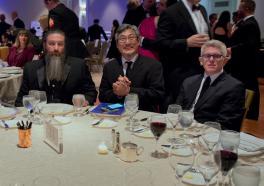 That makes me afraid I’ll never be a good enough mentor, so I pick up the phone every time one of “my Sailors” sends a text, sends a message or calls.
That makes me afraid I’ll never be a good enough mentor, so I pick up the phone every time one of “my Sailors” sends a text, sends a message or calls.
I’m even afraid I’ll never find that one person I was meant to spend the rest of my life with, so I have this rule to go out at least once a week because barring God’s extremely kind will, the likelihood of her delivering my next pizza is extremely low.
I’m afraid that the crew members aboard the H.M.S. Slush Brain have welcomed me to their crew and I’m not good enough to be among them. I’m afraid they’ve asked me to contribute to their anthology and I’m not going to measure up.
 I’m afraid my friends will never know how important they are to me, so I never let them go. Even if we don’t speak for days, months or years, I remember them, and I make it a point to be there when they need. I’m afraid they’ll need me, and I won’t be there, so sometimes I just check in on them.
I’m afraid my friends will never know how important they are to me, so I never let them go. Even if we don’t speak for days, months or years, I remember them, and I make it a point to be there when they need. I’m afraid they’ll need me, and I won’t be there, so sometimes I just check in on them.
I’m afraid I’ll never sell a thousand books, so I plan to write 1,000 of them and sell at least one of each. I’ve only published one book, and I’m already 200 sales ahead of my plan.
I have another confession:
I hope none of these fears go away. (Well, actually I could do with a few of those being resolved, but I promise I have a point.)
I do hope I never stop being afraid because – fuck fear.
I’m up today writing at 12:30 a.m. because I’m afraid of never taking the chance to be better, and if I ever wake up one day feeling like a great author, where do I go from there?
I’m afraid every day and I use my fear as a target to pursue that which I feel is impossible.
This is for you. I don’t know who you are, but if you’re reading this, and you think I’m talking to you – I am. I am, and I love you because you’re afraid, and it’s okay. I know I love you, because I’ve dropped all the other things I’m afraid of so that I can tell you it’s okay to be afraid.
Use your fear. Use that fear to chase away everything you’ve ever been afraid of.
I’m afraid there are people out there who I have loved and will love my whole life that perhaps don’t even remember me, so I wrote a book to create a universe that reminds me nothing can break apart that which love has connected.
I’m afraid of being afraid, so I wrote another book about people who find superpowers in facing their fears.
 I do the things I’m afraid to do because if we never dare to try the impossible, we never achieve the impossible. I do the things I’m afraid to do because if we never face our fears, fear wins. I understand the paradox I’ve created. It’s true. Ultimately, I do the things I fear most because of my innate fear of failure. So I’m fighting a battle I’ve already lost.
I do the things I’m afraid to do because if we never dare to try the impossible, we never achieve the impossible. I do the things I’m afraid to do because if we never face our fears, fear wins. I understand the paradox I’ve created. It’s true. Ultimately, I do the things I fear most because of my innate fear of failure. So I’m fighting a battle I’ve already lost.
Fuck fear.
There are battles worth fighting, and I’ve come to believe that some of those battles must be fought even if those fighting already know they’ve lost. These battles are so critical that the result means less than the need to fight. I imagine people who fight what they see as loosing battles are terrified, but they fight, and every now and then, they win – even when they shouldn’t.
Use your fear to seek out that which you want most in life. What is the thing you won’t give up anything else for? For me, it comes down to three things. My family, my students and my writing. I’ve been told I’d be happier if I gave up teaching. I’ve been told I’d be happier if I gave up writing. No one’s ever been moronic enough to imply I should give up my family, so that’s something.
I would be more comfortable. I’d be less afraid if I just let fear keep me from trying to do the things I’ve wanted to do, but I’m afraid of being a hypocrite.
I tell my students a lot of things. I’m afraid they don’t hear me, so I say it over and over again, and I find different approaches to let them know all of these things I’m afraid they’ll never learn if I don’t make it a point to show them or teach them.
Fuck fear.
There’s one thing I say that’s the most important thing I tell my students, nieces, nephews, and everyone else I can. I share it with you now.
I don’t care WHAT you want in life. Just WANT SOMETHING!
Want something more than you’ve ever wanted something before in your life and don’t let anything else get in your way. I don’t CARE what it is. I just want you to find it and chase it until it’s yours. Then I want you to hold tight to it because you’re too afraid to let it go.
 One of those other things I say a lot is, “I hear with my eyeballs.” I invite you to try the same tactic. Look at your life. What’s the thing you do no matter how tired you are? Who are the people you make time for no matter how busy you are? This doesn’t diminish the existence of other people or other things, it simply shows you what you’re really putting your time into. If the things you want aren’t the things you’re doing, then aren’t you afraid you’ll never get the time to do the things you’ve always wanted?
One of those other things I say a lot is, “I hear with my eyeballs.” I invite you to try the same tactic. Look at your life. What’s the thing you do no matter how tired you are? Who are the people you make time for no matter how busy you are? This doesn’t diminish the existence of other people or other things, it simply shows you what you’re really putting your time into. If the things you want aren’t the things you’re doing, then aren’t you afraid you’ll never get the time to do the things you’ve always wanted?
Fuck fear.
Do those things.
My family loves me. My friends love me. They love me so much they worry over how hard I push myself. I’m afraid some of them don’t understand what I’m really afraid of. I’m afraid that God will call me home (or to Judgement) before I’ve had a chance to ask The Junior if she knows how much I love her. (NOTE: The Junior is one of my nieces.) Years ago I invented a game with her. I’d ask her if she knew how much I love her. She replies, “There’s no limit to how much you love me,” and I tell her, “Don’t you forget it.”
I push myself because I’m afraid my life will end before I write the best book I’ve ever written, and I’m always afraid the next book I write will be better than the next. I’m afraid my students won’t get the information they need or the feedback they need.
Of all my fears, death isn’t one of them because as scary as death is, I won’t allow myself to die without doing everything I can to be the man I’m afraid I’ll never be.
It’s okay to be afraid. Just, please, don’t let fear be that which prevents you from trying. I don’t care if you’re trying to fly , and you were born without legs. I don’t care. Build wings, and take flight. I don’t care if you’ve been told it’s impossible. For those like me who are people of faith, only God determines what it is we can and can not do. For those who do not believe in god, explain to me how we continue to do that which the laws of science once said was impossible.
Maybe I’m too hard on myself, but I’m afraid to give up.
Maybe there’s a better balance, and I’m afraid I’ll never find it.
I’m going to keep trying, and I want you to as well. You’re scared, and I’m afraid you’ll live your whole life afraid without ever once realizing that we’re all afraid. I’m afraid of living without the courage to do those things I’m afraid of doing.
Fuck fear.
I have one more confession:
 I’m exhausted. I wake up at 6:30 and work until 6:30. I go home, and I spend time with my niece (I have quite a few of those) and sister (and even more of those) because I’m afraid they’ll leave, and they won’t know how much I love them. I spend time with them until they go to bed because I’m afraid to miss one moment with them. Then I go downstairs and I write because I’m afraid I’ll never finish revisions on Caught, and that makes me afraid I’ll never start working on Sojourn in Despair. I’m so afraid that I write as I’m writing now at 1:15 a.m.
I’m exhausted. I wake up at 6:30 and work until 6:30. I go home, and I spend time with my niece (I have quite a few of those) and sister (and even more of those) because I’m afraid they’ll leave, and they won’t know how much I love them. I spend time with them until they go to bed because I’m afraid to miss one moment with them. Then I go downstairs and I write because I’m afraid I’ll never finish revisions on Caught, and that makes me afraid I’ll never start working on Sojourn in Despair. I’m so afraid that I write as I’m writing now at 1:15 a.m.
I’m not afraid of being tired. I’m afraid of never taking the time to do all the things I’ve always wanted to spend my life doing. I’m afraid of waking up well rested one day and realizing that thing I wanted was just one hour away.
Sometimes I lose. Fear wins every now and again, but fear is my rival. Fear is my nemesis, and I’m afraid if I slow down for one moment, I’ll fail, and I’m afraid to fail.
I’m going home soon, and I’ll spend every moment I can with everyone I can and I’m afraid there aren’t enough hours in the day to account for all the people I want to spend my time with. How amazingly blessed I am to have that sort of problem. This makes me afraid that I’ll wake up one day with one less person in my life I want to spend that time with. I don’t fear exhaustion.
This is for you, my wonderful dreamers, because I’m just a man with a silly little dream. It’s mine and no one else’s, but no one else needs my dream. I want you to dream your dream, and of all the things it’s okay to be afraid of, please don’t be afraid to dream. Please don’t be afraid to try.
Try. Dream. Fight. In those moments of your life when you’re afraid you’ll never win, and no one is on your side, remember me. Remember me and my silly little dream to do just any random thing that makes others feel it’s okay to dream. I’m here.
I’m here for my family, and I’ll be here for them as long as God allows.
I’m here for my students, and I’ll be there whenever they need me.
I’m here for my proteges, and I’ll be there as often as they want me.
I’m here for you. And on the way home from a writers’ group meeting I was nearly overcome by the fear that you didn’t know.
Fuck fear.





